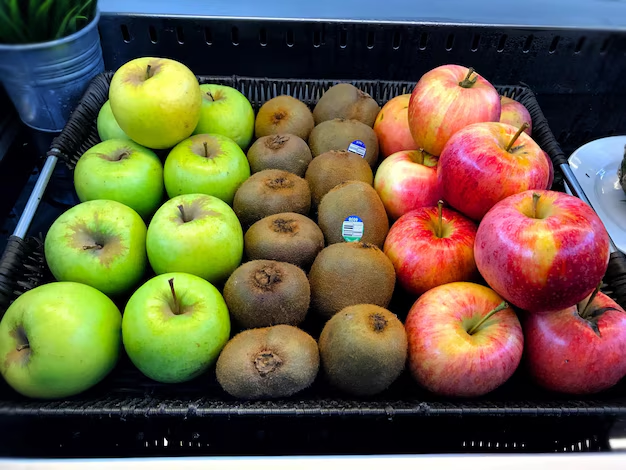🍏 How Long Can You Keep Apples Fresh in the Refrigerator?
Are you tired of reaching into the refrigerator only to find your apples have gone soft or, worse, spoiled? Whether you're a fan of this juicy fruit for its taste, nutritional benefits, or versatility in cooking and baking, knowing how to store apples efficiently can make all the difference. In this guide, we’ll explore the optimal ways to keep your apples fresh for as long as possible, ensuring zero waste and maximum taste.
🍎 Why Store Apples in the Refrigerator?
Maintains Freshness and Crunch
Apples are among the few fruits that genuinely benefit from cooler storage. The lower temperatures of the refrigerator slow down the respiration rate of apples, preserving their crispness and flavor. A well-refrigerated apple is often as crunchy and juicy after weeks as it was the day you bought it.
Nutrition Preservation
Apples stored in the fridge retain their nutrients better than those left on the countertop. The cold slows down the degradation of vitamins and antioxidants, making refrigerated apples a healthier choice over time.
📅 How Long Do Apples Last in the Fridge?
Factors Affecting Shelf Life
Type of Apple: Some varieties, like Fuji and Granny Smith, naturally last longer than others when refrigerated. Softer varieties such as McIntosh might not hold up as well in long-term storage.
Ripeness at Purchase: The initial ripeness of apples can affect their longevity. Fresher, less ripe apples at the time of purchase will last significantly longer.
Storage Conditions: Proper storage techniques, including temperature and humidity levels, play a crucial role in how long your apples will keep.
Expected Shelf Life
Generally, well-stored apples can last anywhere from 4 to 8 weeks in the refrigerator. Some hardy varieties can even remain well-preserved for up to 3 months. It's wise to regularly check your stored apples for any signs of overripeness or spoilage.
📦 Optimal Storage Techniques for Apples
Use of Crisper Drawer
The crisper drawer in your fridge is designed to retain moisture, which helps keep fruits like apples fresh. Aim to keep your refrigerator at about 30-40°F for optimal apple preservation. Tip: Use a slightly higher humidity setting for apples compared to some other fruits and vegetables.
Plastic Bags and Ventilation
Place apples in a perforated plastic bag to improve airflow around the fruit—a significant factor in preventing spoilage. Avoid tightly sealing apples in plastic bags as this can trap ethylene gas, accelerating ripening.
Separate Apples from Other Produce
Apples are known to emit ethylene, a natural gas that speeds up ripening. To prevent other produce from ripening prematurely, store apples separate from vegetables and other fruits.
Whole Apples vs. Sliced Apples
Whole apples stay fresh longer than sliced ones. If you need to store cut apples, consider using an airtight container and sprinkling a bit of lemon juice to prevent browning.
🍏 Should You Wash Apples Before Storing?
While it's essential to wash apples before consumption, avoid washing them before storage. Moisture from washing can promote mold growth and hasten spoilage. Instead, wash apples under running water just before eating.
🍎 Recognizing Spoilage: When to Toss Your Apples
Not all apples will last indefinitely—even with perfect storage practices. Here’s what to watch for:
- Soft or Squishy Texture: Apples should remain firm. If you notice soft areas or bruises, consider using them quickly in recipes or discarding them.
- Dark Spots or Discoloration: Significant changes in color often indicate spoilage.
- Off Smell or Taste: An unpleasant aroma or sour taste suggests that the apples are past their prime.
If only a small section has begun to spoil, cut it away to preserve the rest for immediate use.
🛡️ How to Extend Apple Shelf Life Even More
Consider Freezing
For longer-term preservation, apples can be frozen. Peel, core, and slice your apples before laying them out on a baking sheet to pre-freeze. Once firm, transfer your apple slices into a freezer-safe bag, removing as much air as possible. Frozen apples are excellent for smoothies, baking, or cooked dishes.
Dehydrating for Snacks
Dehydrating apples is another preservation method that extends their shelf life considerably. Dehydrated apples make for a healthy snack that can be stored at room temperature for months.
📝 Quick Reference Summary
Here's a quick summary for keeping your apples fresh:
- 🍏 Use the crisper drawer and keep apples slightly humid.
- 🍎 Perforated plastic bags allow proper air circulation.
- 🥒 Separate apples from ethylene-sensitive produce.
- 🚫 Don’t wash before storage; wash before eating.
- 📅 Regularly check your apples for signs of spoilage.
- ❄️ Freeze apples for long-term use.
- 🍏 Keep in mind that some varieties last longer than others.
Apples are a versatile and delicious fruit, but their shelf life can vary based on a few simple factors. By understanding and applying these storage techniques, you can extend the life of your apples significantly, enjoying them at their best while minimizing waste. So the next time you stock up on apples, remember these tips to keep your fruit crisper for longer! 🍎

